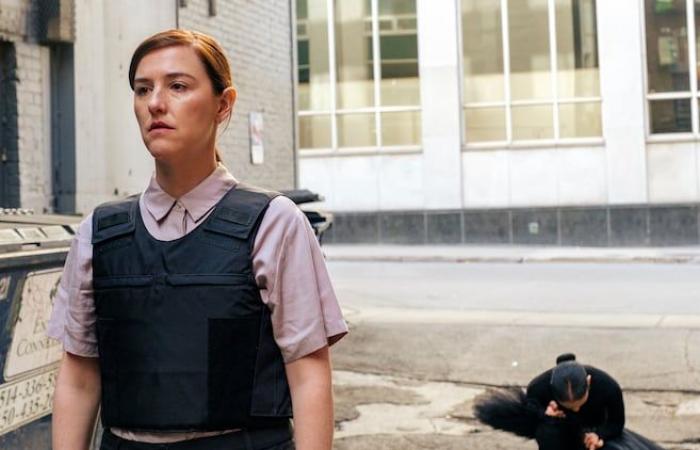But in the hands of Florence Longpré, we know that it will be unique: we risk being moved, thinking, and of course, laughing out loud.
Empathyher new series, may feature patients who have committed serious crimes, but she cannot help but highlight the absurdity, transforming the drama into laughter, as few authors manage to do.
“I wouldn’t know how to write otherwise. It’s my language, I live like that. I laugh when I shouldn’t laugh. A sort of snub,” Florence Longpré, co-author of Do you hear me?, Audrey came back et Raspberry timeto which nothing compares in our TV.
I met the author, who also plays one of the main roles inEmpathyon the film set last August. The hospital in the series was built from scratch in the former National Film Board building on Chemin de la Côte-de-Liesse in Montreal.
In this series of 10 one-hour episodes, which will be online on April 10 on Crave, we will meet Suzanne (Florence Longpré), a former criminologist whom the police got rid of, before she ends up in the Mont-Royal psychiatric institute.
Now a psychiatrist, this poorly shod shoemaker knows the theory like the back of her hand, but has difficulty applying it in practice.
Along his way comes Mortimer, an intervention agent who will help him put his theory into practice.
“These are two damaged profiles who will help each other get better. By caring for others, they also treat themselves,” his interpreter, the French comedian Thomas Ngijol, tells me.
Around the duo, members of the hospital staff as well as patients with serious cases gravitate.
For the fourth time, Florence Longpré teams up with director Guillaume Lonergan, with whom she has developed an obvious bond and who also acts as script-editor this time.
“It was love at first sight with Florence,” recalls the director, thinking back to their meeting, in the third season of Can you hear me?
“It’s some of the most intense stuff I’ve shot,” he says ofEmpathythinking of scenes of crises, common in a psychiatric hospital.
“For us, it can be shocking, but for the staff, it’s routine to see someone putting blood everywhere.”
— Director Guillaume Lonergan
“It’s in the tone of Raspberry time andAudrey came back. We mix very harsh realistic moments with dreamlike or poetic moments.”
To play the character of Mortimer, the production called on a casting agency in France, before choosing comedian Thomas Ngijol, a Frenchman of Cameroonian origin.
Another professional love at first sight for Florence Longpré, who didn’t know him at all. “But in Paris, I couldn’t walk two meters without being stopped in the street. He is known and very popular. Even here, he gets arrested more than me.”
His notoriety, however, did not tip the scales in his favor. “We took him because he’s good.”
“He makes me die of laughter, it’s hard to tour with him and I’m fragile about it too! More seriously, I am very happy with this alliance. They are two very different ways of working but I like this marriage.”
— Florence Longpré on the actor Thomas Ngijol
Ngijol, who really liked Audrey came back on French TV, was all the more attracted to the project as he was filming far from home, in a city he had already visited for the Just for Laughs Festival and for having presented his show there.
“Montreal is calm New York,” says the actor, who adds that “there is darkness, intensity, but also a lot of beauty” in Empathy.
Between filming two scenes, Benoît Brière appears to me with a six-month beard. The patient he plays, Jacques Dallaire, was full of sedatives before reconnecting with reality and understanding what he did wrong.
“It’s an incredible gift for an actor to play such a plural character. It’s in my top 3 of the richest roles I’ve had to play,” he told me, infinitely grateful.
The actor, who speaks of a work that is “twisted but deeply human,” is full of praise for the writing of Florence Longpré.
“She doesn’t write like a girl in her late twenties, early thirties. She writes like a mature woman, because she has such sensitivity to human nature.”
Igor Ovadis, seen here with Lyraël Dauphin, plays a former Russian soldier who refuses to leave his room. (Laurence Grandbois Bernard)
Same enthusiasm from Pascale Montpetit, who plays Dallaire’s sister, the only one to have kept in touch with him.
“I’ve wanted to play Florence Longpré for years. A fierce desire!”
While he played a psychologist in Midnight, eveningthe one that Claude Legault’s character consulted in the public toilets, Igor Ovadis finds himself this time in the opposite role, that of the patient.
His character, Mr. Costco, is a former Russian soldier who refuses to leave his room for fear of being murdered.
“He spends all his time drawing grocery products on the walls. For him, it represents something peaceful,” the actor tells me.
Lamia Benhacine, who plays a coordinator at the institute, has the right words to describe the author’s work.
“She seeks to bring light where there is darkness, by describing situations that are so humanizing.”
“It’s in the absurdity of the situations that it’s funny. We are naturally grotesque in our daily lives. Wherever there is tragedy, there is humor.”
— Lamia Benhacine, who plays the role of Laima
By addressing this serious but very topical subject, Florence Longpré obviously wants to make people think.
“Two psychiatrists from the Philippe-Pinel Institute have helped me for two years to write the series. There was a lot of research.”
While reality is often too hard to bear, fiction allows us to humanize these people who have committed the worst.
“It in no way excuses what they did, but it allows us to understand where it comes from,” continues the author.
Although the title gives the impression that we will only focus on emotions, the series focuses a lot on the medical aspect of psychology.
“There are a lot of flashbacks, we go back to people’s childhoods. Is it at the chemical level that things went wrong? Is it the family context? We are studying this whole range.”
“In mental health, no one knows a straight line. It remains unpredictable. Sometimes it falls, sometimes we come out of it and relapse. We follow this curve in each of the characters.”
— Florence Longpre
The series also stars Adrien Bletton, Marie Eve Morency, Geneviève Alarie, Lyraël Dauphin, Josée Deschênes, Linda Malo, Brigitte Lafleur, Jean-François Nadeau, Sofia Blondin, Denis Bernard and Martin-David Peters.
To respond to this column, write to us at [email protected]. Some responses may be published in our Opinions section.






